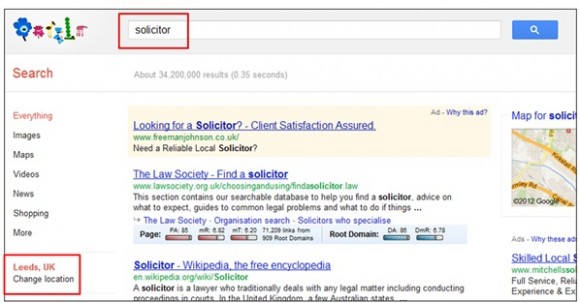Over the past year or so, Google has frequently introduced new updates and key algorithm changes to its ever present global search engine presence. More recognisably to most, especially in the search marketing world, over the last 4 weeks Google has rolled out 40 new algorithm changes to keep search marketers on their toes.
Arguably, one of the most significant and ‘game changing’ within the list of 40 updates is The Google ‘Venice’ Update.
What is it?
Google’s official stance cites it as “Improvements to ranking for local search results. [launch codename “Venice”] This improvement improves the triggering of Local Universal results by relying more on the ranking of our main search results as a signal.”
In short, this latest update will favour more local search results as its ranking factor, and gives us an indication that Google is attempting to make its software more intelligent, by giving the searcher more specific results relating to the location, which it deems more relevant.
When performing a search for the term ‘solicitor’ with the location set to ‘Leeds’ (Google will automatically detect location based on your IP)

We can now see that organic search results for the term ‘solicitor’ include websites with optimised on-page elements relating to their location.

When performing the same search and changing the location to ‘Birmingham’ we can also see that search results appear relating to the location:

Interestingly, when altering the location to ‘London’ and ‘UK’ we are given the same search results. In a post earlier this month from Dave Naylor, he emphasises that if relevant – companies should adopt an SEO strategy that implements ‘London’ based terms on-page to benefit from wider UK based coverage. “It might be worth targeting London in order to hit the national”. Naylor’s point is valid in that businesses can easily adopt a location specific strategy to target London orientated keywords and phrases on-page (if relevant) in order to benefit from a potential increase in traffic to the given website.
Strategy Moving Forward
In my opinion, most key markets should be carefully reviewing their on-page SEO strategies in order to cater for this recent update; especially businesses that are solely targeting specific area(s).
Analysing and Optimising On-Page Elements
Companies that have separate offices/business locations throughout the UK should ensure that each location has its own unique page that is optimised for that specific location. This will give them the potential to rank for key terms within their relevant locations. Key on-page elements such as the title, description, and on-page content should be used to include location orientated terms.
Off-Page Strategy
To reinforce the on-page strategy, location based anchor text should also be obtained to gain higher positions in the SERP’s.


